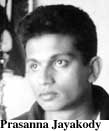 Bold
themes, sensitive acting and visual treats Bold
themes, sensitive acting and visual treats
What a relief one gets seeing a good teledrama amidst a whole heap of
scrap. And when the same creator gives you two, not one, during a week,
it certainly is a bonus!
Tele viewers got a treat recently when a young director showed his capabilities.
He is another  Prasanna
- Prasanna Jayakody - in the same mould as Prasanna Vitanage who is going
places with his cinematic creations. Prasanna
- Prasanna Jayakody - in the same mould as Prasanna Vitanage who is going
places with his cinematic creations.
Prasanna Jayakody handled bold themes in the recently concluded teledramas
- 'Nisala Vila' and 'Imadiya Mankada'. Each had a domineering character
around whom the story developed and Prasanna could not have made better
choices to portray the two characters. In 'Nisala Vila' (based on a novel
by Prasanna's father, Jayasena Jayakody) it was the village monk who did
not sway when he was attacked as an immoral person,most sensitively portrayed
by that versatile actor Suminda Sirisena. In 'Imadiya Mankada', the rusty
villager who tried to give leadership to his fellow folk to save them from
some crafty traders who were up to no good - was superbly acted by Joe
Abeywickrema.
Both teledramas were a visual treat. Quality photography, correct lighting
and the right camera angles made them visually beautiful creations. The
language (both scripts were by Prasanna) had a distinct flavour to suit
the theme of each.
When it came to the acting, Prasanna had got the best of each player.
The way he got young Ama Wijesekera (in the role of the young woman making
wild allegations against the monk) to turn out a mature performance was
ample proof of his capabilities.
And the music in each had its own distinctiveness. Veteran Lionel Algama's
score in 'Imadiya Mankada' was something that will be remembered for a
long time. In the other, a newcomer Gayan Ganakadhara handled the music.
Will they go?
An eight member team of musicians from the Colombo Folk Ensemble has
been selected by the organisers of the Osaka International Chamber Music
Competition and Fiesta to be held next month, to represent Sri Lanka. This
followed an invitation received by the Arts Council where expenses for
travel and accommodation were being met by the organisers. Selected teams
have to bear their living expenses. Our team, which was among 45 countries
short-listed out of 300, has been trying to find a sponsor with no success
so far.
The team comprises well known names in the local music scene - Harsha
Makalanda (piano), Ravibandu (drums), Krishna (percussion), D. D. Gunasena
(violin), Shantilal de Silva (piano), Jagath Meepalage (drums), Priyantha
Dassanayake and Nuwan Balasuriya (flute).
One may ask the obvious question. Why do they have to hunt for sponsors,
why can't the Arts Council bear the costs?
Off to Mid-East
Amaradeva takes off on a music tour of the Middle East later this month
following an invitation from the Sri Lanka Rasika Parishad. He will perform
in Abu Dhabi, Dubai and Oman during the two week tour.
The last link
The recent death of veteran cinema artiste Hugo Fernando saw the removal
of the last link with the first Sinhala film, 'Kadawunu Poronduwa' (1947)
where his name appeared as Sinhala music conductor, lyric writer and playback
singer. He played a role too in the film.
Hugo Master, as he was popularly known , was a regular actor in the
early films in addition to being a music director and a dialogue writer.
He made a name as a comedian. Among his much talked about roles was the
one he played in 'Allapu Gedera' (1965). His tally exceeds a hundred films.
Book Shelf
English via Sinhala
At a time when there is a keen interest in learning English, Sarasavi
Publishers has put out a useful and comprehensive guide-the fifth edition
of David Wijeratne's 'English via Sinhala'.
The book is a simple presentation divided into three main sections -
Language, Letter writing and Vocabulary.
Over 300 pages are devoted to language and deal with numerous aspects
of grammar in 51 lessons. These are presented in a meaningful manner by
using Sinhala terms and examples alongside the English, making it easy
for the reader to follow what is being presented without getting confused
with the terminology. The explanations are simple and varied. At the end
of each lesson is an exercise.
Letter writing in English has become a nightmare for many who feel their
knowledge of the language is inadequate to express clearly what they want
to say. 'English via Sinhala' teaches even the basics of letter writing
- the form of a letter, classification, salutation and conclusion. A number
of sample letters - private, business, official and letters to the editor
- gives the reader a base to write his own letters.
An extensive vocabulary on a variety of topics is included and the book
ends with a section on revision exercises helping the reader to test his
knowledge at the end of the study.
Sarasavi Publishers deserve a big 'thank you' for making this book available
once again.
- Ranat
|







